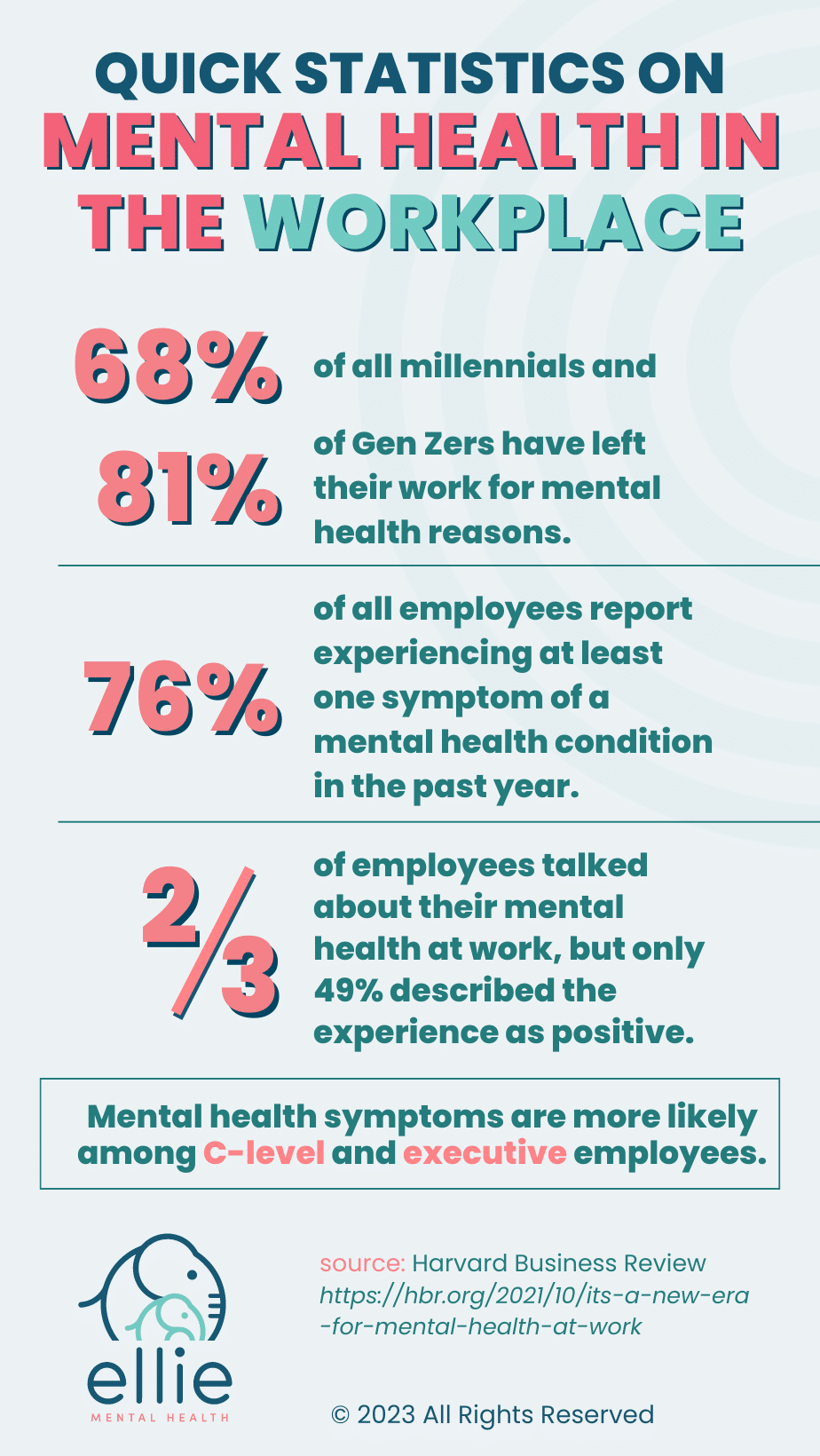Everyone has mental health, and whether or not you have a mental health disorder, everyone has bad mental health days. So, what do you do when your mental health is getting in the way of your work (or vice versa)? If you consistently struggle with debilitating depression, anxiety, ADHD, OCD, PTSD, or another condition, how do you – or should you – disclose this with your boss?
There isn’t one right answer. How you approach mental health in the workplace greatly depends on your needs, your work environment, and your unique situation. However, no matter the details, one fact remains true: your mental health comes first, and it’s important to prioritize your needs.
Advocating for your mental health might even mean having to talk with your boss, whether it’s to ask for a day off, brainstorm solutions to improve your mental health at work, or perhaps even to take a leave of absence so you can receive more intensive treatment than your job allows.
If you’re planning to have a discussion with a boss or supervisor about your mental health, here are some tips for to navigating the conversation.
Are you struggling with poor mental health at work? Reach out to Ellie Mental Health to get matched with an amazing therapist near you.
Normalizing Mental Health Discussions in the Workplace

The average American spends about 40 hours a week at work. So if you’re like most people living in the U.S., this means that you spend about 86 days, or one-fourth of every year at work (or more, if you’re among 1 in 5 Americans who report regularly working overtime).
Work is a big part of our lives and has a large impact on our mental health – affecting our confidence, our identity, our relationships, our stress levels, and our overall satisfaction with life. And while it may have been taboo to talk about your mental health at work in the past, this is rapidly changing. Our work and our mental health are closely tied, and it is imperative for both employees and employers that we learn to be comfortable with talking about mental health at work.
Whether you’re struggling with debilitating anxiety at work or experiencing signs of burnout and don’t know where to go from here, trying to “suck it up” and push through can backfire. With continued poor mental health at work, not only will you likely see a decrease in productivity and performance in the workplace, but other areas of your life may suffer as well.
For example, you might notice you’re too spent by the end of the day to take care of yourself, eat healthy meals, exercise, or better your emotional health through activities like journaling, spending time with friends, or meditating. You might struggle to get enough sleep at night or wrestle with feelings of dread and anxiety as the weekend comes to an end.
The reality is that when people don’t feel comfortable talking about their mental health with their boss, there’s a higher likelihood that they’ll leave their jobs. Recent statistics show that 68% of millennials and 81% of Gen Zers have left their work for mental health reasons and that 76% of all employees report experiencing at least one symptom of a mental health condition in the past year.
As we continue to fight mental health stigma and re-envision a workplace where employers put their employee’s mental health higher on the priority list, this includes opening the door for healthy conversations about mental health without fearing repercussions – and bosses understanding what solutions are available and effective, for helping their workforce balance their workload and mental health needs.
When Is It Necessary to Talk About Mental Health at Work?
Firstly, you’re never obligated to talk about your mental health with your boss – or anyone you don’t feel comfortable with. While we believe that mental health should be something everyone should be able to talk about without shame or worry, opening up about your mental health will always be your choice. And if your boss isn’t the nicest person on earth or you’re simply not ready to disclose what you’re dealing with, that’s 100% okay. We would encourage you to talk with someone you’re comfortable with, such as a qualified therapist, to come up with a plan that is best for you.
Conversely, it’s important to remember that your employer can only support you if they know there is an issue. While you don’t need to tell your boss every time you’re struggling, it’s likely a good idea to discuss your mental health if:
- Your work performance is suffering and you can’t meet the demands of the job
- You feel you are being overworked or burnt out by your workload
- You experienced a recent trauma or loss and need time to heal and grieve
- You’re struggling with severe mental health issues and need to prioritize your healing
- You have an addiction or a substance abuse issue and need to receive treatment
- You are having a difficult day and would like to take a mental health day
- You are considering quitting because of your mental health
How To Have a Conversation With Your Boss About Your Mental Health
If you’ve decided to talk to your boss about your mental health, here are some tips on how to make the conversation as productive as possible.
1. Reflect on What You’re Experiencing
Mental health issues aren’t always clear. You might know you feel off or that you’re struggling to get through the workday, but the source of the problem can be hard to pinpoint. Are you struggling with work because you have poor mental health? Or is your mental health struggling because you have a poor work environment? Are there outside factors impacting your mental health right now, such as a tumultuous relationship or unresolved trauma? While you don’t need to have all the answers, reflect on what you’ve been experiencing and what solutions you feel could help you during this time.
2. Consider Your Goal for the Conversation
What is it that you’re hoping to gain from discussing your mental health? Are you hoping for a more realistic workload? Do you need some time off? Is there anything that absolutely must change for you to keep this job? It’s a good idea to know your expectations, needs, and terms going into the conversation.
3. Schedule a Conversation With Your Boss
While you might think it’s easiest to wait until you can organically bring up your mental health needs to your boss, ideally, you should schedule the conversation. Simply let your boss or HR team know you have something important to discuss.
4. Only Share What You’re Comfortable With
You only need to tell your boss what you’re comfortable telling them. For example, you can tell your boss you recently experienced a traumatic event and that it’s severely affecting your mental health and work-life without sharing all the details. Of course, you can share more if you want, but you’re not obligated to. If you don’t have a close relationship with your boss or are worried they might press you for more information, consider involving HR or asking for a third person to join.
5. Put Yourself in Your Boss’s Shoes
Remember that your boss is only human and might not have the right answers immediately. They may not have been prepared for the conversation or have a quick solution to offer. Also, if you are working for a smaller business, it’s possible they won’t be able to accommodate your requests. While these situations can be uncomfortable and difficult for both parties, try to have empathy for your boss throughout the process and understand where they are coming from.
6. Ask If There Are Any Available Resources
Many employers now provide their employees with a wide range of mental health benefits, such as comprehensive health coverage that includes behavioral health benefits, free subscriptions to mental health apps, an Employee Assistance Program (EAP), or access to external wellness programs. Consider asking your boss if there are available resources you’re not currently utilizing.
7. Schedule a Follow-Up Conversation
Once your conversation comes to a conclusion, consider proposing a follow-up conversation. The last thing you want is for the discussion to go nowhere. At the end of the day, while you hope your boss will be on top of things, it’s your responsibility to keep the ball moving and ensure your mental health needs are met.
Making the Workplace a Better Place
The modern workplace is changing, and generally for the better. Employers are becoming more aware of how work impacts mental health, and many businesses are making important changes to promote a healthy work culture and to support their employees’ mental health.
Remember that your mental health matters, including at work. You’re not just a cog in the wheel. You’re a person with needs and limits, and discussing these with your employer could be a great way to find solutions that help you thrive at work.
Looking for solutions to help improve your mental health at work? Discover your happiest, most productive self and meet with an Ellie therapist near you – in-person or online.


